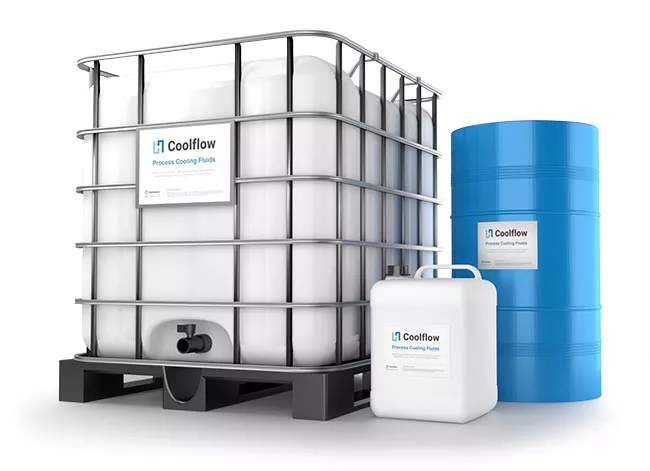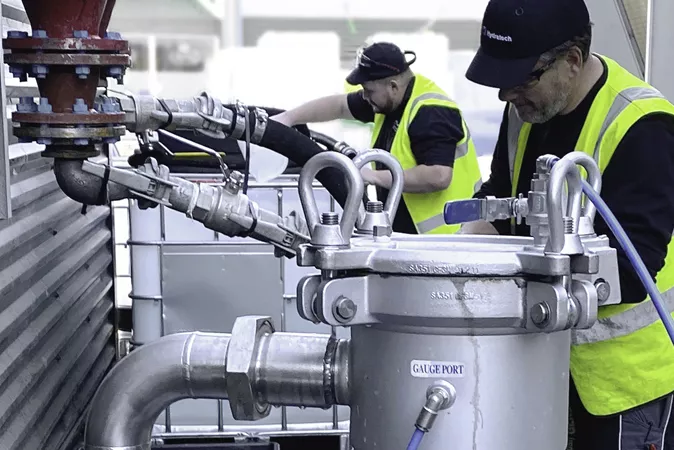Coolflow® Fluids
A range of fully inhibited heat transfer fluids, with antifreeze function, for use in all RAC, HVAC and glycol chiller systems.
More about Coolflow®Hydratech’s holistic approach to process and hydronic system optimisation encompasses:
Fluid Selection
Heat transfer fluid characteristics (process coolants, secondary refrigerants, glycols etc) have a direct and long-lasting impact on system performance, production output, energy consumption, maintenance and down-time.
Efficient thermal energy transfer, minimal pumping-energy consumption, long-term preservation of pipework/system components, cost, and minimal environmental impact, all need to be considered when selecting the optimum fluid for cooling systems.
Hydratech work with RAC consultants to understand individual system design, thermal and pumping demands. Fluid thermodynamics, toxicity, corrosion chemistry and aerobic bacteria, are all key considerations when selecting an appropriate formulation, mixing ratio and compatible inhibitor package.
Proven to reduce energy costs by >10% (as verified by Star Technical Services), Coolflow DTX® is a revolutionary secondary refrigerant, suitable for replacing propylene glycol in food and cold storage cooling systems. Performance wise, DTX has very similar heat transfer and pumping characteristics to ethylene glycol and subsequently benefits from numerous operating advantages such as low viscosity, low dose rates and smaller systems and plant footprints onsite.
By retrofitting existing systems - moving from propylene glycol to DTX, many of the UK’s leading processing, manufacturing and logistics operations have reported improved performance and efficiency gains, alongside considerable energy/cost/CO2 savings.
Fluid Monitoring
Based on many years of experience, it is not uncommon for the maintenance of cooling and heating systems to be overlooked. Under such circumstances various issues can develop, including advanced corrosion, biological fouling and sediment formation. All of which will have a direct and negative impact on heat transfer efficiency, pumping performance and energy consumption.
Hydratech’s in-house laboratory carries out analytical fluid testing of cooling system fluids, primarily microbiological and chemistry testing - to identify water contaminates, bacterial presence, water treatment levels or the make-up of elements.
By taking a proactive approach to fluid analysis, those responsible for managing or maintaining CHW systems can detect issues early and take remedial action before fluid efficiency and system condition are compromised. Even when heat transfer fluids have been carefully selected and commissioned, they can still be prone to degradation - leading to loss of heat transfer capacity, unplanned maintenance, and costly shutdowns.
Fluid Management
Hydratech Fluid Management Services (FMS) provides specialist engineering and maintenance services to customers installing, commissioning, operating, or optimising large cooling and heating systems.
By combining expertise in water-treatment chemistry, fluid-thermodynamics, and mechanical engineering, Hydratech FMS division delivers a fully integrated approach to hydronic systems management. This in-turn maximises the potential for optimised performance, reduced operational costs and maximum return on investment.
Specialist hydronic pipework services include:
Typical hydronic systems worked-on include, process cooling, secondary refrigeration, chilled storage, beverage dispense, renewable energy, process heating, air-conditioning and data centre cooling.
Hydratech’s team of account managers, chemists and service engineers can assist with all aspects of heat transfer fluid performance, running costs, environmental impact, compatibility, and energy efficiency.
Call: 01792 586800 or email: info@hydratech.co.uk
Regular analysis can extend the life of both fluid and system. Hydratech’s Fluid Monitoring Program (FMP) is a very straight forward, effective way to proactively monitor closed-loop system condition.

A range of fully inhibited heat transfer fluids, with antifreeze function, for use in all RAC, HVAC and glycol chiller systems.
More about Coolflow

If you need help or advice on selecting the most suitable product for your needs call one of our sales engineers today. With experience across many industry sectors we can help you find the most cost effective solution whilst meeting all your technical re
Call today on (860) 653-1691
Sorry, we need you to complete all the required fields before we can process your enquiry.